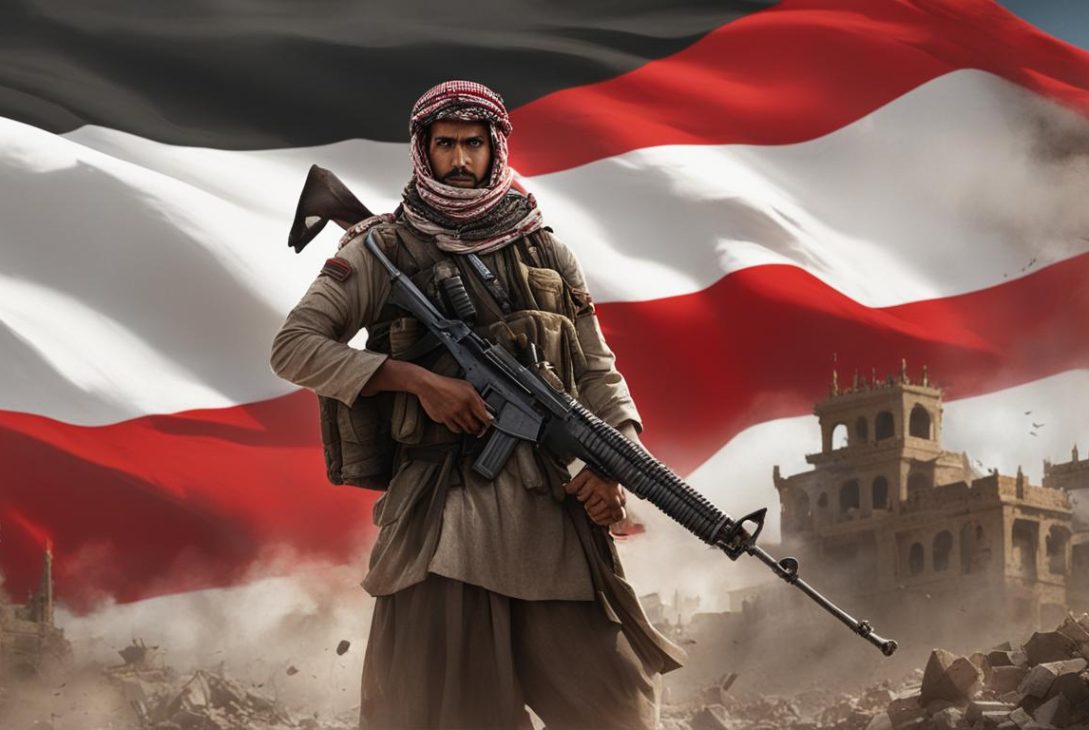The world is on edge as Yemen has officially declared war on the United States, sparking a new and dangerous conflict in the already volatile region. The escalation in tensions is linked to the ongoing war in Gaza, as Yemen’s Houthi rebels have targeted US military assets in the Red Sea. This declaration of war has far-reaching implications for US-Yemen relations and has raised concerns about the stability of the region and the safety of international shipping.
Key Takeaways:
- The Houthi rebels in Yemen have declared war on the United States, escalating tensions in the region.
- This conflict is connected to the ongoing war in Gaza, as the Houthis target US military assets in the Red Sea.
- The US military has responded to Houthi attacks on a cargo ship, utilizing the USS Gravely destroyer to protect US personnel and equipment.
- International efforts are underway to address the escalating conflict and protect commercial shipping in the Red Sea.
- The Yemeni people continue to bear the brunt of this conflict, with devastating humanitarian consequences and war fatigue.
U.S. Military Responds to Houthi Attacks on Cargo Ship
The U.S. military has swiftly responded to a series of Houthi attacks on a cargo ship in the Red Sea. The USS Gravely destroyer, part of the U.S. Navy, successfully intercepted and neutralized two anti-ship ballistic missiles that were fired at the vessel. Soon after, the USS Gravely found itself engaged in a confrontation with small boats belonging to the Houthi rebels. In an act of self-defense, U.S. Navy helicopters returned fire, sinking three out of the four attacking boats. It is important to note that no harm was caused to any U.S. personnel or equipment, and there were no reported casualties from the cargo ship.
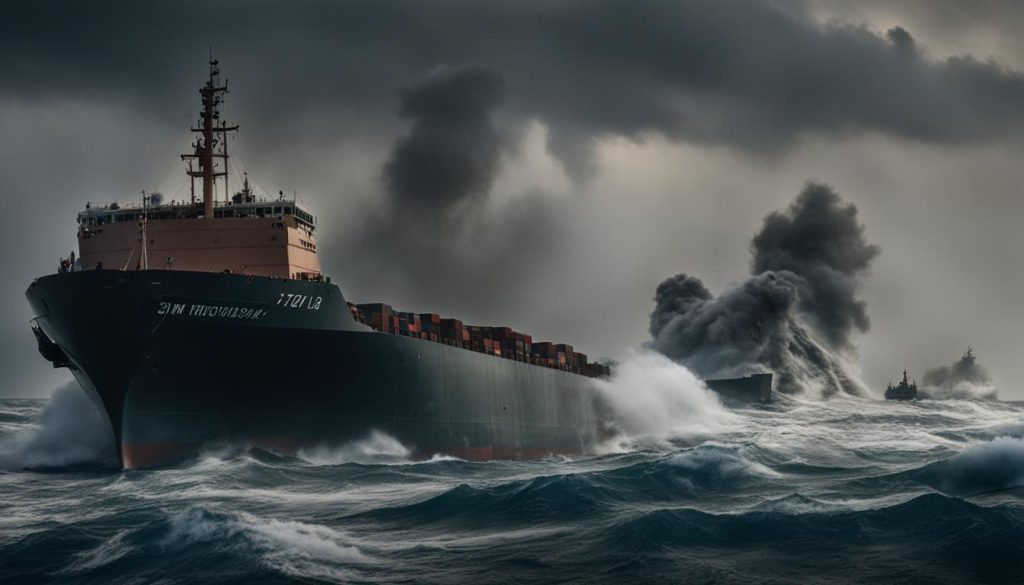
This swift and decisive response from the U.S. military demonstrates its commitment to protecting its interests and the safety of its personnel and assets. The U.S. Navy’s ability to detect and neutralize threats in the Red Sea has been vital in safeguarding commercial shipping routes in the region. Such strong defensive actions serve as a deterrent against future Houthi attacks on cargo ships.
The USS Gravely destroyer played a crucial role in intercepting and neutralizing the anti-ship missiles, showcasing the advanced capabilities of the U.S. Navy. With its state-of-the-art radar systems and missile defense systems, the USS Gravely effectively defended the cargo ship from imminent danger.
The U.S. military’s prompt and efficient response to the Houthi attacks on the cargo ship demonstrates its commitment to maintaining stability and security in the Red Sea region. – U.S. Navy spokesperson
It is evident that the U.S. military remains vigilant and prepared to counter any threats posed by the Houthi rebels in the volatile Red Sea conflict. With the ability to swiftly respond and neutralize such attacks, the U.S. Navy plays a crucial role in protecting international maritime interests and ensuring the safety of vital shipping routes in the region.
| Key Points: |
|---|
| The USS Gravely destroyer intercepted and neutralized two anti-ship ballistic missiles. |
| US Navy helicopters sank three out of the four small boats launched by the Houthi rebels. |
| No harm to US personnel, equipment, or casualties from the cargo ship were reported. |
Yemen’s Motivation for the Attacks
The ongoing conflict in Yemen has been characterized by a series of attacks carried out by the Houthi rebels on ships in the Red Sea. These attacks are driven by several interconnected factors, including the Yemen conflict itself, the relationship between the US and Israel, and the recent offensive in Gaza.
The Houthi rebels claim that the targeted ships are either linked to Israel or carrying goods destined for Israeli ports. Their main objective is to exert pressure on Israel and its allies, with the ultimate goal of bringing an end to the Israeli air-and-ground offensive in the Gaza Strip. This offensive was triggered by an attack launched by the Palestinian militant group Hamas.
“By targeting international shipping, the Houthis aim to disrupt the flow of goods and create economic pressure on Israel, thereby forcing a cessation of the offensive in Gaza,” explains an expert on Middle East conflicts.
The Houthi rebels perceive the US-Israel relationship as a key driver of the conflict in Yemen and see their actions as a form of resistance against perceived Israeli aggression. By attacking ships in the Red Sea, they aim to draw international attention to the situation and garner support for their cause.
It is important to note that the Houthi rebels are just one faction involved in the complex Yemen conflict, which involves multiple actors with varying interests and goals. Understanding the motivation behind their attacks provides valuable insight into the factors shaping the ongoing conflict in Yemen.
Key Points:
- The Houthi rebels in Yemen are carrying out attacks on ships in the Red Sea.
- The attacks are motivated by the desire to put pressure on Israel and its allies, with the aim of ending the Israeli offensive in Gaza.
- The Houthi rebels perceive the US-Israel relationship as a key driver of the conflict and see their actions as a form of resistance.
- These attacks highlight the complexity of the Yemen conflict and the interconnected nature of regional conflicts in the Middle East.
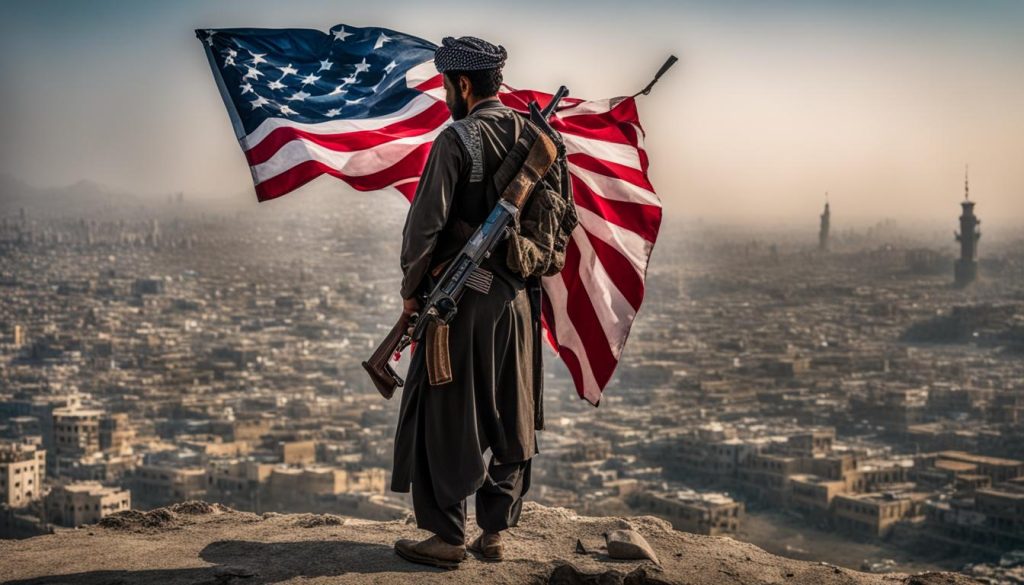
International Response to the Conflict
In response to the escalating conflict in the Red Sea region, the international community has come together to address the challenges posed by the Houthi attacks and ensure the safety and security of vessels in the area. The United States, recognizing the need for a united front, has taken the initiative to establish an international coalition dedicated to maritime security.
The International Maritime Mission
The newly formed international coalition aims to protect vessels traveling through the Red Sea region and safeguard the vital waterway. The coalition consists of nations including the United Kingdom, Bahrain, Canada, France, Italy, the Netherlands, Norway, Seychelles, Spain, and Greece. This diverse group of countries brings together their collective expertise, resources, and commitment to maritime security.
“We are dedicated to countering the threats posed by the Houthi attacks and ensuring the safety of commercial shipping in the Red Sea region. Together, we will stand united to protect the rights of vessels and promote the stability of the maritime domain.”
Maritime Security and Protection of Vessels
The primary objective of the coalition is to establish a robust and comprehensive framework for maritime security. This includes implementing measures to deter and respond to any hostile actions in the Red Sea region. By bolstering coordination and information sharing, the coalition aims to enhance situational awareness and provide timely protection to vessels traversing through the area.
The international coalition focuses on the security of commercial shipping, recognizing its crucial role in global trade and economic stability. By ensuring the safe passage of vessels, the coalition aims to prevent any disruptions to the flow of goods and mitigate the risks faced by the shipping industry.
Protecting the Red Sea Region
The Red Sea region holds immense strategic importance due to its key trade routes and proximity to various conflict-prone areas. The coalition’s efforts are aimed at not only safeguarding vessels but also maintaining stability within the region. By collaborating with regional partners and leveraging their collective capabilities, the coalition seeks to promote peace and security in the Red Sea region.
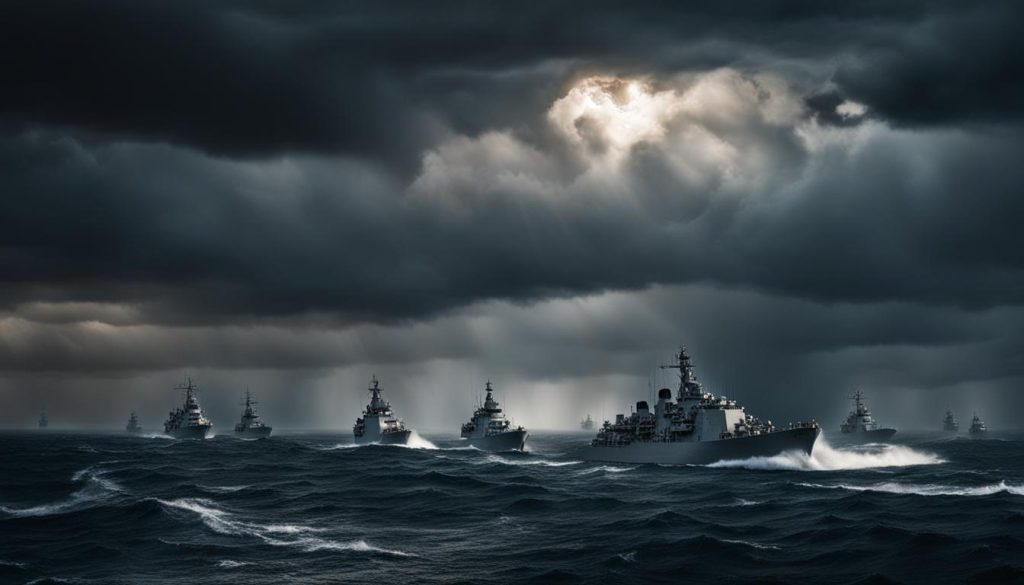
The establishment of this international coalition is a testament to the shared commitment towards maritime security and safeguarding the interests of all nations operating in the Red Sea. Through collective efforts and cooperation, the coalition aims to effectively counter the threats posed by the Houthi attacks and ensure the free and secure passage of vessels in this vital region.
Repercussions for Shipping Industry
Following the attacks on the Maersk Hangzhou, a Denmark-based shipping giant, the company has decided to suspend shipping through the Red Sea for 48 hours. This decision is aimed at investigating the details of the incident and assessing the security situation.
The attacks by the Houthis on international shipping have raised concerns within the shipping industry and have the potential to disrupt global trade.
The shipping industry plays a crucial role in facilitating global trade and ensuring the smooth movement of goods across borders. Any disruption or suspension of shipping routes can have significant consequences for businesses and economies worldwide.
The Maersk Hangzhou is one of the largest container ships in the world and operates on major trade routes. The decision to suspend shipping through the Red Sea highlights the seriousness of the situation and the need to address the security concerns raised by the attacks.
Impact on Global Trade
The suspension of shipping through the Red Sea can have far-reaching implications for global trade. The Red Sea is a vital waterway that connects Europe, Asia, and Africa. It serves as a strategic route for the transportation of goods, including oil, gas, and other commodities.
Disruptions in this region can lead to delays in the delivery of essential goods, increased shipping costs, and supply chain disruptions. This can affect various industries, including manufacturing, agriculture, and retail.
The shipping industry relies heavily on predictable and safe transport routes to ensure efficient trade. Any incident that poses a threat to the security of shipping routes can have a ripple effect on global trade flows and economic stability.
Addressing Security Concerns
The attacks on the Maersk Hangzhou and other international shipping vessels in the Red Sea region highlight the need for enhanced maritime security measures.
International efforts have been made to establish and strengthen multilateral coalitions to protect vessels traveling through high-risk areas. These initiatives aim to deter and counter threats, such as piracy and attacks by non-state actors.
The attacks by the Houthis have underscored the importance of coordinated international action in ensuring the safety and security of shipping in the Red Sea and other critical maritime regions.
Efforts to enhance maritime security involve deploying naval assets, conducting coordinated patrols, sharing intelligence, and implementing measures to improve the response capabilities of naval forces. These initiatives aim to create a conducive environment for global trade and secure the movement of goods across international waters.
US-Iran Relations and the Yemen Conflict
The conflict in Yemen involving the Houthi rebels has further strained US-Iran relations. The Houthis, an Iranian-backed alliance, have received moral and financial support from Iran, heightening tensions between the two nations. It is important to note that the US had previously recognized the Houthis as a foreign terrorist organization but revoked that status in 2021.
The ongoing conflict in Yemen, coupled with the Houthi attacks on international shipping in the Red Sea, has raised concerns about the possibility of US military intervention in the region. The Houthis’ alliance with Iran and their continuous aggression have prompted discussions about the extent to which the US should become involved.
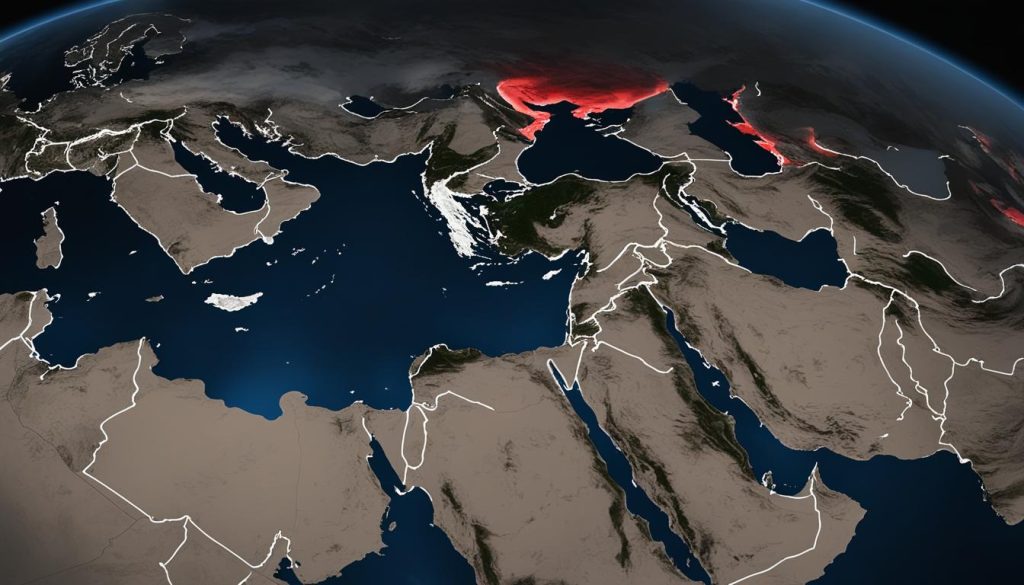
Houthi Fighters and the Iranian-Backed Alliance
The Houthi rebels in Yemen have been at the forefront of the conflict, challenging the internationally recognized government. As an Iranian-backed alliance, the Houthis have access to significant military capabilities and have been able to sustain their fight against opposing forces.
| Houthi Fighters | Iranian Support |
|---|---|
| Well-trained and equipped fighters | Moral and financial assistance |
| Control over strategic locations in Yemen | Supply of advanced weaponry |
| Ability to launch cross-border attacks | Operational and tactical guidance |
Potential for US Military Intervention
The ongoing conflict and the threat posed by the Houthis to international shipping have sparked discussions about the possibility of US military intervention in Yemen. While the US has supported Saudi Arabia’s military campaign against the Houthis in the past, direct military intervention by the US remains a contentious issue.
“The US must carefully evaluate the potential consequences of military intervention in Yemen. While it is important to address the threat to international shipping and regional stability, any military action should be weighed against the potential for further escalation and civilian casualties.” – Expert on Middle East Affairs
Strained Relations and Diplomatic Efforts
The conflict in Yemen has strained US-Iran relations, complicating diplomatic efforts to resolve the crisis. Despite these challenges, diplomatic channels remain open, with ongoing negotiations and discussions to address the various issues at play.
The international community, including the United Nations, has been actively involved in mediating the conflict and facilitating peace talks. Efforts to find a peaceful resolution have been underway, but the influence of external actors, including Iran, continues to shape the course of the conflict.
In Summary
The conflict in Yemen involving the Houthi rebels has strained US-Iran relations and raised concerns about the possibility of US military intervention. The Houthis’ alliance with Iran, their continuous attacks on international shipping, and their control over strategic locations in Yemen have heightened tensions in the region.
As the situation in Yemen evolves, diplomatic efforts and careful consideration of the potential consequences of military intervention will be crucial in finding a lasting solution to the conflict.
Houthi Attacks on Israel
The conflict in the Red Sea region has witnessed a series of missile and drone attacks launched by the Houthi rebels towards Israel. These attacks have targeted various locations in Israel and have posed a significant threat to the country’s security. Israel, however, has employed robust air defenses that have effectively intercepted many of these attacks or caused them to fall short of their intended targets.
The Israeli air defenses have been successful in countering the Houthi arsenal of drones and missiles, ensuring the safety of Israeli civilians and infrastructure. With multiple layers of defense systems in place, including the Iron Dome, Israel has been able to neutralize these threats and minimize the potential damage.
The Houthi movement, known for its access to a significant arsenal of drones and missiles, has been continually testing the capabilities of Israeli air defenses. While some attacks have managed to breach the defense systems, their impact has been limited due to the prompt and effective response of Israeli security forces.
“Israel’s commitment to protecting its citizens is unwavering. Our air defense systems, including the Iron Dome, have proven to be highly reliable and successful in intercepting threats posed by the Houthi attacks,” said an Israeli defense spokesperson.
The continuous Houthi attacks on Israel highlight the volatile nature of the conflict in the region and the need for strong defensive measures. Israel remains vigilant and prepared to respond to any further threats that may arise from the Houthi movement.
| Key Points | Details |
|---|---|
| Attacks | Houthi missile and drone attacks on Israel from the Red Sea |
| Israeli Air Defenses | Effective interception and neutralization of Houthi attacks using multiple defense systems, including the Iron Dome |
| Houthi Arsenal | The Houthi movement possesses a significant arsenal of drones and missiles |
| Response | Israel remains vigilant and prepared to respond to further threats from the Houthi movement |
False Claims of Yemen Declaring War on Israel
There have been false claims circulating on social media that Yemen has declared war on Israel. These claims are based on a statement released by the Houthi group, which controls parts of Yemen, including the capital. However, it is important to note that the internationally recognized government of Yemen is based in the southern port city of Aden and is not affiliated with the Houthi group.
International Efforts for Peace in Yemen
The ongoing conflict in Yemen has sparked international efforts to establish peace and stability in the region. With the aim of ending the violence and addressing the humanitarian crisis, the warring parties have committed to a ceasefire and engaged in a UN-led peace process.
The ceasefire serves as a crucial step towards de-escalation and the protection of civilian lives. It provides an opportunity for negotiations and dialogue to find a sustainable solution to the conflict. By implementing a temporary cessation of hostilities, the warring parties can begin to rebuild trust and work towards a lasting peace agreement.
The UN-led peace process plays a pivotal role in facilitating discussions and negotiations between the conflicting parties. It offers a platform for all stakeholders to voice their concerns and aspirations, enabling a comprehensive and inclusive approach to conflict resolution. Through diplomatic efforts and mediation, the international community seeks to find common ground and address the root causes of the conflict.
“Peace is not the absence of conflict, but the presence of justice.”
– Martin Luther King Jr. –
However, there are concerns about Iranian involvement and support for the Houthi rebels. The United States has accused Iran of providing weapons and tactical intelligence to the Houthis, undermining the peace process and exacerbating the complexity of the situation. This involvement adds another layer of challenge to the efforts for peace in Yemen.
It is crucial for all international stakeholders to actively engage in supporting the peace process and to ensure that the warring parties honor their commitments. By addressing the underlying issues and grievances, fostering dialogue, and providing the necessary resources, the international community can contribute to a sustainable resolution of the conflict in Yemen.
International Efforts for Peace in Yemen
| Efforts | Key Players |
|---|---|
| UN-led Peace Process | United Nations, Yemeni Government, Houthi Rebels, International Community |
| Humanitarian Aid and Assistance | International Organizations, NGOs, Donor Countries |
| Diplomatic Negotiations | Regional Powers, Mediators, International Envoys |
| Arms Embargo | United Nations, Security Council, Participating Countries |
The path to peace in Yemen is challenging, but with sustained international support, commitment, and cooperation, there is hope for a brighter future for the Yemeni people. The resolution of the conflict will contribute to regional stability and alleviate the immense suffering endured by the Yemeni population.
Impact on Yemeni People
The ongoing conflict in Yemen, marked by Houthi attacks and international involvement, has had a devastating impact on the Yemeni people. This has led to severe humanitarian crises, resulting in a high number of civilian casualties and widespread suffering among the Yemeni population.
The Yemeni people are caught in the crossfire of a protracted war, enduring unimaginable hardships and experiencing the loss of loved ones. The conflict has disrupted essential services, such as healthcare, education, and access to clean water, exacerbating the already dire situation in the country.
The toll on the Yemeni population is evident in the staggering number of civilian casualties, with innocent men, women, and children paying the ultimate price. The indiscriminate nature of the attacks has raised serious concerns globally, as innocent lives are constantly at risk.
“The Yemeni people have endured unimaginable suffering due to the ongoing conflict. The humanitarian crises in the country have resulted in an alarming number of civilian casualties and a deep sense of despair.” – Humanitarian Organization Representative
The war fatigue among the Yemeni population is palpable. Years of continuous violence and instability have taken their toll, leading to exhaustion and a widespread desire for peace and stability. The population yearns for an end to the conflict and an opportunity to rebuild their lives.
The Houthi attacks on international shipping further exacerbate the situation, as there are concerns about the potential for a new war sparked by these actions. The Yemeni people are caught in a vicious cycle of violence and uncertainty, longing for a more peaceful and prosperous future.
The Human Cost of the Conflict
The conflict in Yemen has resulted in significant civilian casualties, leaving families shattered and communities torn apart:
| Statistic | Number |
|---|---|
| Civilian Deaths | Over 8,000 |
| Displaced People | Over 4 million |
| Children Facing Acute Malnutrition | Over 2 million |
| Deaths Due to Lack of Medical Care | Over 100,000 |
The numbers above only scratch the surface of the immense suffering endured by the Yemeni people. It is crucial that immediate action is taken to address the humanitarian crises and prioritize the well-being of the Yemeni population.
The international community must come together to provide critical aid and support to alleviate the suffering of the Yemeni people. Efforts are needed not only to provide immediate relief but also to work towards lasting peace and stability in Yemen, ensuring a better future for generations to come.
Conclusion
In conclusion, the ongoing conflict between Yemen and the US, marked by Houthi attacks and the US military response, highlights the complex nature of the Red Sea conflict. These incidents have far-reaching implications, with international coalitions getting involved and the shipping industry feeling the impact. It is crucial to prioritize efforts for peace and the well-being of the Yemeni people in order to address and resolve this ongoing crisis.
The escalation of tensions in the Red Sea region calls for a comprehensive understanding of the underlying dynamics and motivations driving the conflict. As Yemen declares war on the US and Houthi attacks on international shipping continue, diplomatic efforts must be intensified to prevent further escalation and ensure stability in the region.
The involvement of international coalitions, such as the newly established coalition by the US, UK, and other nations, reflects the recognition of the global significance of the Red Sea conflict. By working together, these coalitions aim to protect vessels and maintain maritime security in this vital waterway, mitigating the threats posed by the Houthi attacks.
In summary, the Yemen-US war and the ongoing tensions in the Red Sea region require a multi-faceted approach. It is important to address the root causes of the conflict while focusing on protecting the interests of the international community, ensuring the safety of shipping routes, and addressing the humanitarian concerns of the Yemeni people. By promoting dialogue and finding diplomatic solutions, the international community can strive for lasting peace and stability in Yemen and the wider region.
FAQ
Has Yemen declared war on the US?
Yes, Yemen has declared war on the US, escalating tensions between the two countries.
How has the US military responded to Houthi attacks on a cargo ship?
The US military, specifically the USS Gravely destroyer, shot down two anti-ship ballistic missiles and engaged in a confrontation with small boat attackers in the Red Sea.
What is the motivation behind the Houthi attacks?
The Houthi rebels in Yemen are carrying out these attacks in an effort to pressure Israel and its allies to end the Israeli air-and-ground offensive in the Gaza Strip.
How has the international community responded to the conflict?
In response to the escalating conflict in the Red Sea, the US has established an international coalition consisting of countries like the UK, France, and Greece to protect vessels traveling through the region.
What are the repercussions for the shipping industry?
Following the Houthi attacks on the Maersk Hangzhou, a shipping giant, the company has decided to suspend shipping through the Red Sea for 48 hours to assess the security situation.
How does the Yemen conflict impact US-Iran relations?
The conflict has further strained US-Iran relations, as the Houthi rebels are an Iranian-backed alliance, and the US has accused Iran of providing support to the Houthis.
Are the Houthi attacks affecting Israel?
The Houthi rebels have launched missile and drone attacks towards Israel from the Red Sea, but so far, these attacks have either been intercepted by Israeli air defenses or have fallen short of their intended targets.
Is it true that Yemen has declared war on Israel?
No, there have been false claims circulating on social media. The internationally recognized government of Yemen is not affiliated with the Houthi group that controls parts of Yemen.
What are the ongoing international efforts for peace in Yemen?
The warring parties have committed to a ceasefire and a UN-led peace process, although concerns about Iranian involvement and support for the Houthis have complicated these efforts.
What is the impact of the conflict on the Yemeni people?
The Yemen conflict has resulted in a devastating humanitarian crisis, with high civilian casualties and widespread suffering among the population.
Source Links
- https://www.npr.org/2023/12/31/1222339528/u-s-forces-say-they-killed-the-boat-crews-in-a-houthi-ship-attack-in-the-red-sea
- https://www.aljazeera.com/where/yemen/
- https://www.newsweek.com/fact-check-has-yemen-declared-war-israel-1839965
as yemen's houthi rebels have targeted us military assets in the red sea. this declaration of war has far-reaching implications for us-yemen relations and has r the world is on edge as yemen has officially declared war on the united states yemen declares war on the us: breaking news
Last modified: January 17, 2024


